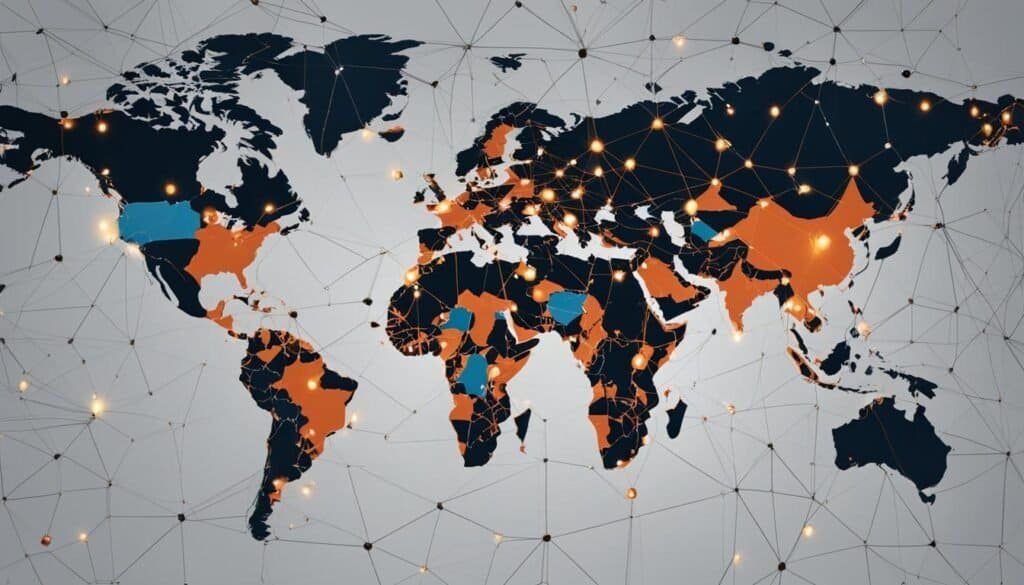Welcome, dear readers! In this digital age, we depend heavily on technology for our daily activities. However, with increased reliance comes a higher risk of cybersecurity threats, including hacking. Hacking, the act of gaining unauthorized access to a system or network, has become a major concern worldwide. In this section, we will explore the reasons why hacking is considered illegal and delve into the existing laws and cybersecurity regulations that enforce the prohibition of unauthorized access and malicious activities.
Key Takeaways:
- Hacking is illegal worldwide due to the potential harm it can cause to individuals, businesses, and governments.
- Existing laws and cybersecurity regulations prohibit unauthorized access and malicious activities.
- Cybersecurity threats have increased with a rise in technology use, highlighting the importance of robust cybersecurity regulations.
Understanding Hacking and Its Implications
Hacking, in simple terms, refers to any unauthorized access to a computer or computer system. As technology has advanced, so have the methods and tools used for hacking, leading to an increase in cybercrime. The consequences of hacking can be severe, ranging from financial loss to national security threats.
So what exactly are the implications of hacking? The answer is multifaceted and complex. One of the most significant implications of hacking is the threat of cybercrime. Cybercrime refers to any criminal activity conducted through the use of a computer or the internet. Examples of cybercrime include identity theft, fraud, and intellectual property theft.
The consequences of cybercrime can be far-reaching. One study estimates that cybercrime costs the global economy $600 billion annually. These costs can come in the form of direct financial loss for businesses and individuals, as well as the cost of investigations and legal proceedings. Additionally, cybercrime can negatively impact a company's reputation and the trust that consumers have in it.
The Legal Implications of Hacking
Aside from the financial and reputational damage caused by hacking and cybercrime, there are also legal implications. Hacking is illegal in most parts of the world, and individuals caught engaging in hacking activities may face legal penalties, including fines and imprisonment.
In the United States, hacking is considered a federal crime under the Computer Fraud and Abuse Act. This law makes it illegal to intentionally access a computer without authorization or to exceed authorized access. Violations of the CFAA can result in fines and imprisonment of up to ten years.
Similarly, in the United Kingdom, hacking is considered a cybercrime and is punishable by up to two years in prison. If the hacking leads to serious financial or societal harm, the penalty can be up to 14 years in prison.
"Hacking is illegal in most parts of the world, and individuals caught engaging in hacking activities may face legal penalties, including fines and imprisonment."
It is essential to understand the legal implications of hacking to discourage individuals from engaging in these activities. However, it's important to note that not all hacking is illegal. Ethical hacking, also known as "white-hat" hacking, is conducted with the permission of the computer's owner and is intended to identify vulnerabilities and improve security.
In conclusion, the implications of hacking are far-reaching, and it's essential for individuals and organizations to understand the potential consequences of engaging in illegal activities. With robust cybersecurity measures and increased awareness, we can work toward creating a safer digital environment for all.
Global Cybersecurity Concerns
In today's digital age, cybersecurity is more crucial than ever before. As more and more aspects of our personal and professional lives move online, the risks posed by cyber threats, including hacking, are on the rise. The increasing frequency and sophistication of cyberattacks have created significant concerns for individuals, businesses, and governments worldwide.
The need to combat cybercrime and protect online security has given rise to a growing number of cybersecurity regulations. These regulations aim to address the risks posed by malicious actors who seek to exploit vulnerabilities in computer systems or networks.
The Importance of Cybersecurity Regulations
Robust cybersecurity regulations are an essential aspect of maintaining online security. These regulations serve as a framework for establishing and enforcing the necessary measures to protect against cyber threats, including hacking.
Effective cybersecurity regulations provide guidelines for organizations and individuals to protect their networks against unauthorized access, data breaches, and other malicious activities. They help ensure that adequate measures are in place to safeguard confidential information, including personal and financial data.
Moreover, cybersecurity regulations can help prevent the disruption of critical infrastructure and government operations. Implementing strict cybersecurity regulations is essential to protect against cyberattacks that can lead to significant financial losses, reputational damage, and even threaten national security.
The Global Cybersecurity Landscape
Cybersecurity concerns are not confined to any particular region or country; they are global. As such, governments and international organizations must work together to establish protocols to combat cybercrime.
The importance of cooperation in this regard cannot be overstated. Cybercriminals operate across international borders, and it is therefore necessary to establish a coordinated approach to tackle these threats.
Ensuring online security requires ongoing investment in cybersecurity measures, including the development of new regulations and technologies. International cooperation can help foster innovation in this field and promote the exchange of knowledge and best practices.
Conclusion
The increasing frequency and sophistication of cyberattacks have made cybersecurity a top priority for individuals, businesses, and governments worldwide. The implementation of strong cybersecurity regulations is crucial to safeguard against hacking and other cyber threats. As the global cybersecurity landscape continues to evolve, international cooperation and innovation will be critical to maintaining online security and protecting against future threats.
The Legal Framework: Hacking Laws and Regulations
Hacking is considered a serious crime in many countries around the world, and various laws and regulations have been implemented to address the issue of cybercrime. In most countries, hacking is considered a computer crime and is punishable by law.
The legal framework surrounding hacking activities typically focuses on unauthorized access to computer systems and data theft. The laws are designed to protect individuals, businesses, and governments from the malicious activities of hackers.
Hacking Laws
The specific laws regulating hacking activities vary by country, but they generally prohibit unauthorized access, data theft, and other malicious activities. In the United States, the Computer Fraud and Abuse Act (CFAA) is the primary law that governs hacking activities. The CFAA provides for both civil and criminal penalties for hacking offenses.
Other countries have similar laws in place, such as the Computer Misuse Act in the United Kingdom and the Cybersecurity Information Sharing Act in Australia.
Cybercrime Regulations
In addition to specific hacking laws, many countries have broader cybercrime regulations that address a wide range of online criminal activity. These regulations typically include provisions for data protection, privacy, and other aspects of online security.
For example, the European Union's General Data Protection Regulation (GDPR) imposes strict requirements for data protection and privacy. The regulation applies to all individuals and organizations that handle personal data of EU citizens, regardless of where the data is stored or processed.
The Implications of Cybercrime
The consequences of engaging in hacking activities can be severe. Depending on the nature of the offense, hackers can face hefty fines, imprisonment, or both.
In addition, hacking can cause significant financial damage to individuals, businesses, and governments. The costs associated with data breaches and other cyber attacks can be staggering, and the impact can be felt for years to come.
Furthermore, cybercrime can have a negative impact on public trust in online systems and services, which can undermine the effectiveness of e-commerce, online banking, and other critical online services.
In light of these implications, it is crucial for individuals and organizations to prioritize cybersecurity regulations and work together to combat hacking and protect our digital ecosystem. By adhering to cybersecurity best practices and staying up to date with the latest regulations, we can help ensure a safer and more secure online environment for all.
Differentiating Ethical Hacking from Illegal Hacking

While hacking is considered illegal, there is a difference between ethical hacking and engaging in illegal activities online. Ethical hacking, also known as "white hat hacking," is the practice of identifying vulnerabilities in computer systems and networks for the purpose of improving security. Ethical hackers seek permission from the owners of the system before performing any tests.
On the other hand, illegal hacking involves unauthorized access to computer systems and networks, with the intention of stealing data, causing damage, or engaging in other malicious activities. Illegal hackers, also known as "black hat hackers," operate without the knowledge or consent of the system owner, and often use their skills for personal gain or to cause harm.
It is crucial to differentiate between these two types of hacking. Ethical hacking is a valuable practice that can help identify and address vulnerabilities before they are exploited by illegal hackers. It is important to recognize and respect the ethical considerations of hacking practices, and engage in them responsibly.
"Ethical hacking is like locking your front door to find vulnerabilities, while illegal hacking is like breaking into someone else's house without their permission."
The Consequences of Hacking
Engaging in hacking activities can have severe consequences, both legally and financially. In addition to facing imprisonment and fines, hackers can also cause significant damage to individuals, businesses, and society as a whole.
One of the main consequences of hacking is the potential financial impact on the victim. Hackers can steal sensitive data, compromise financial accounts, and demand ransom payments, resulting in significant financial losses. For example, a recent study found that cybercrime costs businesses worldwide over $1 trillion each year. (source)
| Type of Consequence | Explanation |
|---|---|
| Legal Penalties | Individuals caught engaging in illegal hacking activities can face severe legal consequences, including imprisonment and hefty fines. |
| Financial Damages | Hackers can cause significant financial losses to individuals and businesses through theft of sensitive data, compromised financial accounts and even ransom demands. |
| Reputational Damage | Victims of hacking attacks may suffer reputational damage if sensitive data is stolen or leaked, leading to a loss of trust and credibility. |
| Impact on Society | Hacking activities can have a wide-reaching impact on society, disrupting critical infrastructure and causing widespread chaos and panic. |
Another consequence of hacking is reputational damage. Victims of hacking attacks may suffer significant reputational damage if sensitive data is stolen or leaked, leading to the loss of trust and credibility with customers and stakeholders. This damage can take years to repair and can result in significant financial losses.
Finally, hacking activities can have a significant impact on society as a whole. Hackers can compromise critical infrastructure, such as power grids and transportation systems, causing widespread chaos and panic. This has the potential to undermine public trust in institutions and governments, leading to social and economic instability.
In conclusion, the consequences of hacking can be severe, both for the individual hacker and for society as a whole. It is crucial for individuals, businesses, and governments to prioritize cybersecurity regulations and work together to combat hacking and protect our digital ecosystem.
International Cooperation in Combating Hacking

In today’s interconnected world, cyber threats know no borders. Cybercriminals can operate from anywhere, and a single attack can cause damage to individuals, businesses, and governments across the globe. This is why international cooperation is crucial in combating hacking and strengthening online security.
The United Nations has been at the forefront of initiatives aimed at addressing cybersecurity issues. In 2015, the UN adopted the International Telecommunication Regulations, which outline the principles for the secure and reliable functioning of international telecommunications networks. This was followed by the establishment of the UN Group of Governmental Experts on Developments in the Field of Information and Telecommunications, which aims to promote international cooperation and the exchange of information on issues related to information and telecommunications.
Moreover, the Council of Europe’s Convention on Cybercrime remains the only binding international treaty on cybersecurity. The convention requires signatories to adopt legislation criminalizing the use of computer networks for criminal purposes, including hacking.
International cooperation also takes the form of information sharing and joint efforts to combat cybercrime. Interpol, for example, has established a Global Complex for Innovation in Singapore, which brings together experts to collaborate on cybercrime investigations. In addition, the Five Eyes intelligence alliance, consisting of the United States, Canada, the United Kingdom, Australia, and New Zealand, works together on cybersecurity issues and shares intelligence to counter cyber threats.
Cybersecurity regulations and hacking laws differ across countries, and international cooperation is necessary to create a unified approach to combatting hacking and cybercrime. With the growing importance of digitalization, international cooperation and collaboration are more critical than ever to protect individuals, businesses, and governments from the growing risks of cyber threats.
Protecting Against Hacking: Best Practices and Prevention
Ensuring online security is crucial in today's digital age. With cyber threats becoming more advanced, it's essential to take proactive measures to protect yourself and your organization. Here are some best practices and prevention strategies to keep in mind:
Use Strong Passwords
The first line of defense against hacking attempts is to use strong passwords. Avoid using common phrases or personal information, and opt for a combination of uppercase and lowercase letters, numbers, and symbols. Using a password manager is also highly recommended to store and generate complex passwords.
Regularly Update Software
Software vulnerabilities can provide hackers with backdoor access to your computer systems. It's vital to keep your computer systems up to date with the latest security patches and updates to prevent hacking attempts. Make sure to enable automatic updates whenever possible.
Train Employees on Cybersecurity
One of the biggest risks to online security is human error. It's crucial to educate employees on cybersecurity best practices such as recognizing phishing attempts, identifying suspicious links, and reporting unusual activity. Regular cybersecurity training can significantly reduce the risk of successful hacking attempts.
Implement Data Encryption
Data encryption is a critical aspect of online security. Encryption ensures that sensitive data such as passwords and financial information are unreadable to unauthorized users. Make sure to implement data encryption for all sensitive information and use secure communication channels whenever possible.
| Best Practices | Prevention Strategies |
|---|---|
| Use strong passwords | Regularly update software |
| Train employees on cybersecurity | Implement data encryption |
In addition to these measures, it's crucial to implement robust cybersecurity regulations and stay up to date on the latest hacking techniques and emerging threats. Online security is an ongoing process, and it's essential to remain vigilant and proactive in protecting against potential hacking attempts.
"Online security is an ongoing process, and it's essential to remain vigilant and proactive in protecting against potential hacking attempts."
Emerging Threats and Evolving Hacking Techniques
The world of hacking and cybersecurity is continually evolving, with new techniques and threats emerging all the time. As online security measures continue to improve, so too do the skills and tactics of hackers. It is critical to stay informed about emerging threats and take proactive steps to protect against them.
New Types of Malware
Cybercriminals are continually developing new types of malware designed to evade detection and compromise computer systems. Ransomware attacks have become increasingly prevalent, with hackers encrypting victims' files and demanding payment in exchange for the decryption key. Newer types of malware include fileless malware, which is designed to operate in a computer's RAM to avoid detection by traditional antivirus software.
Social Engineering Attacks
One of the growing trends in hacking is social engineering attacks, which involve manipulating people into divulging sensitive information. These attacks can take many forms, such as phishing emails and phone calls, vishing (voice phishing), and pretexting. With the growing use of social media, hackers are using social engineering tactics to gather information about their victims and craft convincing scam messages.
Cloud Security Risks
The increasing prevalence of cloud-based systems and services has brought new security risks. While cloud providers offer robust security measures, users can still be vulnerable to data breaches caused by misconfiguration, human error, or insider threats. As more businesses and individuals move their data to the cloud, it is essential to understand the risks and take steps to secure sensitive information.
IoT Vulnerabilities
The Internet of Things (IoT) refers to the growing network of internet-connected devices, from smart home devices to industrial control systems. As the number of IoT devices continues to grow, so too do the vulnerabilities associated with them. Insecure IoT devices can be easily compromised, giving hackers access to sensitive information or control over critical systems.
Strengthening Cybersecurity Regulations
As new threats and techniques emerge, it is essential for governments and businesses to work together to strengthen cybersecurity regulations. Implementing robust security measures, such as multi-factor authentication and encryption, can help mitigate the risk of data breaches and other cyberattacks. Regular security audits and employee training can also help to prevent social engineering attacks and other types of cybercrime.
Protecting Against Emerging Threats
To protect against emerging threats, it is essential to stay informed and proactive about cybersecurity. Users should keep their systems up to date with the latest security patches and use strong passwords and multi-factor authentication. Businesses should implement strict access controls and regularly review their security policies to ensure they stay up to date with evolving threats.
The Future of Hacking and Cybersecurity
As technology continues to advance, the hacking landscape is sure to evolve along with it. Cybersecurity regulations must adapt and remain up-to-date to address these emerging threats. With the world becoming increasingly interconnected, cybersecurity will only become more critical in the future.
One of the most significant challenges facing cybersecurity is the rise of artificial intelligence (AI) and its potential use in hacking activities. AI algorithms can be used to identify vulnerabilities and launch attacks on a massive scale, making them much more effective than traditional hacking methods.
Another emerging threat is the use of blockchain technology by hackers. While blockchain is often touted as a secure digital ledger, it is not impervious to attacks. Hackers can exploit vulnerabilities in blockchain systems to steal cryptocurrency or launch distributed denial-of-service attacks.
To combat these emerging threats, cybersecurity regulations must be innovative and forward-thinking. Governments and businesses must work together to identify potential vulnerabilities and develop effective countermeasures. This collaboration is integral in maintaining a secure digital environment.
The Importance of Hacking Laws and Cybersecurity Regulations
The legal framework governing cybercrime and hacking activities must also adapt and evolve to keep pace with technological advances. Governments around the world are implementing new hacking laws and cybersecurity regulations to protect against the growing threat of cybercrime.
For example, the European Union's General Data Protection Regulation (GDPR) is a comprehensive cybersecurity regulation that requires businesses to implement strong data protection measures and report data breaches promptly. Failure to comply with the GDPR can result in significant financial penalties.
Similarly, the United States has implemented several federal cybersecurity regulations to address cybercrime and protect critical infrastructure. These laws include the Computer Fraud and Abuse Act (CFAA) and the Cybersecurity Information Sharing Act (CISA).
As the world becomes more digitized, cybersecurity regulations and hacking laws will only become more critical in ensuring a secure digital environment for businesses and individuals worldwide.
Conclusion
In conclusion, hacking is considered illegal worldwide due to the potential cybercrime that may result from unauthorized access and malicious activities. As explored in this article, there are existing laws and regulations governing the hacking landscape, and cybersecurity concerns continue to grow as hackers evolve their techniques.
Individuals, businesses, and governments must prioritize cybersecurity regulations and work together to combat hacking. The consequences of engaging in illegal hacking activities can result in severe legal penalties, financial damages, and impact society as a whole.
The Importance of Cybersecurity
With the increasing reliance on technology, protecting against hacking attempts has become more critical than ever. It is crucial to implement best practices and prevention strategies to safeguard against hacking and ensure online security.
The future of hacking and cybersecurity is ever-evolving, with new threats emerging continually. The need for continuous adaptation and innovation in cybersecurity regulations is crucial to counter these evolving threats.
Ultimately, protecting against hacking and cybercrime is a collective responsibility, and it is crucial for individuals, businesses, and governments to prioritize cybersecurity measures and cooperate internationally to ensure a secure digital environment for all.
What are the Laws Regarding Hacking in the US?
Hacking laws in the us encompass a range of regulations, aiming to address and deter unauthorized access to computer systems. The Computer Fraud and Abuse Act (CFAA) serves as a primary federal law dealing with hacking offenses. It criminalizes activities like accessing protected computers without authorization, causing damage, or stealing sensitive information. State laws may also supplement federal statutes to further combat cybercrime, ensuring legal consequences for hacking activities across the country.
FAQ
Why is hacking illegal?
Hacking is illegal because it involves unauthorized access to computer systems and malicious activities, which violate cybersecurity regulations and laws.
What are the consequences of hacking?
The consequences of hacking can include legal penalties, financial damages, and negative impacts on individuals, businesses, and society as a whole.
What are hacking laws and regulations?
Hacking laws and regulations are specific legal frameworks implemented to address cybercrimes and protect individuals, businesses, and governments from malicious hacking activities.
What is the difference between ethical hacking and illegal hacking?
Ethical hacking is conducted with the intent of identifying vulnerabilities and improving security, whereas illegal hacking involves unauthorized access and malicious intent.
How can individuals and organizations protect against hacking?
It is important to practice strong cybersecurity measures, such as using complex passwords, keeping software updated, and being cautious of suspicious online activities.
What are the emerging threats in hacking?
Hacking techniques are evolving, and emerging threats include new methods of attack, such as ransomware and social engineering, which require continuous adaptation in cybersecurity regulations.
How can international cooperation combat hacking?
International cooperation is crucial in sharing information, coordinating efforts, and establishing collaborative agreements to strengthen cybersecurity measures and combat hacking and cybercrime.
What is the future of hacking and cybersecurity?
The future of hacking and cybersecurity will require advancements in both hacking techniques and corresponding regulatory measures to ensure a secure digital environment.





